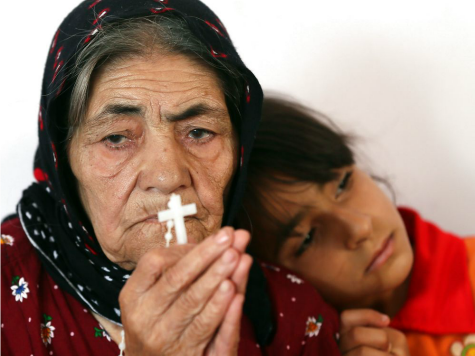Last week, Chaldean Patriarch Louis Raphael Sako issued an impassioned plea to theinternational community to speak out and take action on behalf of persecutedArab Christians and other minorities. This latest statement came a month after120,000 Iraqi Christians were forcibly displaced from their homes.
Sako, Iraq’ssenior Christian cleric, called the systematic persecution “a real genocide”and called for “decisive steps” to put pressure on decision-makers at home andabroad to ensure a free, safe life for all in Iraq.
In Washington, DC, a bipartisan and ecumenical conference starts Tuesday evening, focusing onthe deteriorating situation facing millions of Christians and other religiousminorities in the Middle East. The three-day event sponsored by In Defense ofChristians (IDC) will feature speakers from all over the globe.
The IDC Summit for Middle East Christians is the firstoccasion in history where six Christian Patriarchs from the Middle East willgather together in the United States.
IDC President Toufic Baaklini said,Christians and other groups in the Middle East have endured discrimination,persecution, and religious cleansing. Today, as the Islamic State continues itsgenocidal campaign against Christians in Iraq and Syria, the globe is finallyawakening to their plight. “
In his statement last week, Bishop Sako accused Iraqileaders of jockeying for positions rather than addressing the urgent needs oftheir citizens. “What hurts us most,” Sako writes, “is the inability of themachinery of the government to impose law and order in front of the ongoingand significant deterioration of security, which fosters a culture of violencethat provides the extremist groups a favorable locale to expand!”
Sako’s latest declaration followed on the heels of recentcomments regarding UScomplicity in Iraq’s current situation. On August 28, Sako said that theUnited States was “indirectly responsible” for the current chaos inIraq, where the advances of Islamic State jihadists over the past few monthshave led to thousands of deaths and raised charges of ethnic cleansing.
“The U.S. is indirectly responsible for what is going on inIraq as it said it would ensure democracy and the well-being of the people, but10 years have passed and on the contrary we have gone backward,” Sako toldreporters at Beirut’s airport.
“Iraq has been divided … and the Americans left Iraq inthe midst of a vacuum where there was no army to protect [the people] and ISISand these jihadist groups have been present for four years,” he said.
“There were about 1 million Christians in Iraq and more thanhalf of them have been displaced. Only 400,000 are left while displacement isstill rising,” Sako added.
Sako has been one of the strongest voices against religiouspersecution in Iraq. In July 2014, Sako led a wave of condemnation of the SunniIslamists who demanded Christians either convert, submit to their radical ruleand pay a religious levy, or face death by the sword. Hundreds of Christianfamilies left Mosul, many of them stripped of their possessions as they fledfor safety.
At the time Sako, said that Islamic State militants who droveChristians out of Mosul were worse than Mongol leader GenghisKhan and his grandson Hulagu, who sacked Baghdad in 1258.
The Chaldeans are Eastern Rite Catholics in communion withRome.
Sako’s comments found an echo in statements Monday byformer US Ambassador to the Holy See, Raymond Flynn. The American people — andPresident Barack Obama — need to stand up for Christians and other minoritygroups in Iraq who have no voice, he said on NewsmaxTV.
“The international community is silent,” Flynn said. “The WhiteHouse is silent. The media is silent. What has happened to the conscience ofthe American government that one time they were in the forefront of these kindof issues? I thought we learned our lesson from Rwanda, Bosnia, and certainlyfrom the Holocaust, but apparently those horrendous lessons that we should’velearned, we haven’t learned yet. America, this is a great shame, and we’ve gotto speak out.”
Meanwhile, Pope Francis continues to emphasize the critical situation in the MiddleEast. He held two separate meetingslast Thursday, first with the ex-president of the State of Israel, Shimon Peresand next with Jordanian Prince El Hassan Bin Talal. Both meetings focused onpeace and the role of religions. Peres presented to the Pontiff his plan tocreate a sort of “United Nations” for religions, as a way to promote peaceespecially in troubled areas such as the Middle East. Pope Francisis more powerful than the United Nations when it comes to advocating peace,former Israeli President Shimon Peres said. Peres, while visiting the Vaticanasked Pope Francis to head a parallel United Nations called the “UnitedReligions” to counter religious extremism in the world.
Peres said the United Nations and its peacekeepers “donot have the force or the effectiveness of any one of the Pope’s homilies,which can draw half a million people just in St Peter’s Square alone.”
“So given that the United Nations has run its course,what we need is an organization of United Religions,” Peres said, asfaith.” “What we need is an unquestionable moral authority who saysout loud, ‘No. God doesn’t want this and doesn’t allow it,'” he added.
Bin Talal is the founder of the “Royal Institute for Interfaith Studies” andlikewise explained the center’s activity to the Pope, underscoring the commonground shared by religions and the possibilities of collaboration in activitiesof solidarity.

COMMENTS
Please let us know if you're having issues with commenting.